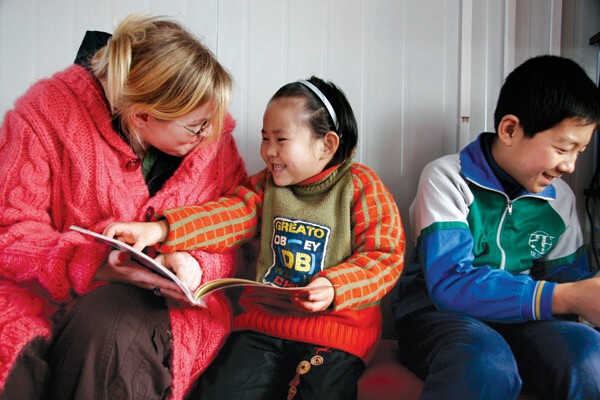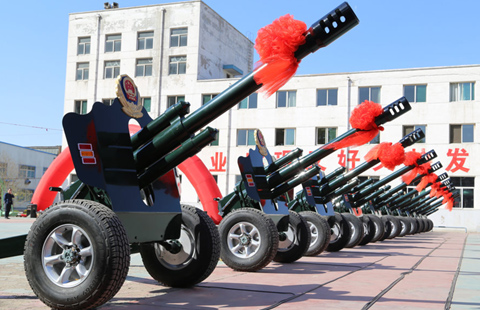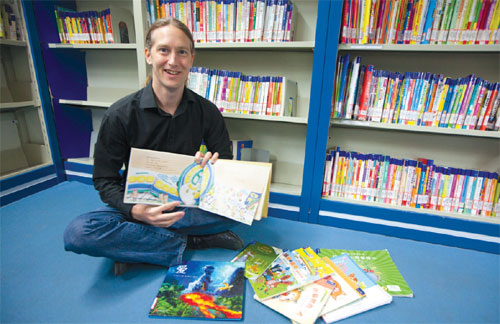The charge of the charity brigade
Updated: 2015-04-10 12:19
By Matt Hodges and Yu Ran in Shanghai(China Daily USA)
|
|||||||||
 |
|
The Library Project was founded in 2006 by Tom Stader (below) to raise money for libraries for schools in rural areas. [Gao Erqiang / China Daily] |
American women in Shanghai are playing an active role in helping orphans and underprivileged kids across the nation
Six-year-old Wang Kanghui was running out of time. The farming couple who adopted him several years earlier had gone into debt trying to cover his medical bills and his ailing heart was not expected to beat much longer.
Then his luck changed and a Shanghai-based charity stepped in. He nearly died three times in hospital but survived the operation. Three years later, the American woman who was instrumental in saving his life visited him in neighboring Anhui province.
"He wants to be a doctor now to save other lives," said Karen Carrington, the executive director of Heart to Heart Shanghai, which has helped 860 children of impoverished families receive heart surgery.
Over 70 million poor rural Chinese earn an annual income of less than 2,300 yuan ($375). Despite being the second-largest economy in the world, China remains a nation under the shadow of poverty. There are about 40 million children in China's poorest areas, almost double the population of Australia.
The State Council took concrete steps to reduce child poverty when it approved the Underprivileged Children's Development Plan (2014-2020) in November, promising benefits ranging from better prenatal care to effective and affordable education.
But some still slip through the gaps.
Shanghai is home to scores of charities that expats run or support in full-or part-time roles, mostly as volunteers that are helping the government to realize this ambitious goal.
Some are well-educated women who have followed their husbands overseas on executive job postings. Others came independently with a mission to make a difference. Many are from the US. Supporting children with health issues is a common theme.
"Many are trailing spouses with great corporate backgrounds who can't find challenging jobs here and who are looking for ways to give back to China in a meaningful way," said Tori Zwisler, 58, from Wisconsin.
In 1999, she founded the Shanghai chapter of Roots & Shoots, which developed from a global initiative led by the British primatologist Jane Goodall. It now has 18 full-time staff and 50,000 volunteers, mostly Chinese.
Denver's Naomi Kerwin launched One Less Orphan last year to lower the risk of abandonment among poor families by helping secure medical treatment for their kids. She spent seven years in Beijing as the project manager of a software company before dedicating herself full-time to charity.
"I quit my job to take over a foster home run by a South African woman in Xi'an (Shaanxi province) who was taking care of 46 kids. I first came to Shanghai to care for a brain-damaged young girl," she said.
At Baobei Foundation, volunteers raise funds for orphaned babies who need neurological or gastro-intestinal surgery.
Mifan Mama founder Julie Garrett of Blackpool, England, is another example of a trailing spouse who has become a pillar of the expat community. Her charity provides food, milk powder, diapers, education and medical support to orphanages in four provinces.
In recent years, a growing number of new non-governmental organizations have sprung up to meet middle-class aspirations to help out and society's need for services in sectors such as natural resource management and education.
Some 500,000 NGOs have been registered in the last quarter of a century, including 6,000 foreign NGOs, according to government statistics.
Although dwarfed by the 1,000s of Chinese-run charities in the city as philanthropy takes deeper root in China, Western women like these are working to promote greater transparency and sustainability in the field, they claim.
US tops giving index
The fact that so many Americans are so keen to lend a helping hand should not come as a big surprise.
According to the 2014 edition of the World Giving Index, published in November, the US ranks joint No 1 with Myanmar in terms of generosity.
The scores were based on an average of three measures of giving behavior in a typical month: the number of people who donate money to charity, those who volunteer their time, and those who help a stranger. They were compiled from over a million interviews conducted by Gallup as part of its World Poll survey.
On an individual basis, locally-based expats from New York to LA are more likely to give their time than money, and they are spoilt for choice.
Shanghai Young Bakers sends Chinese orphans to France to train as bakers, and helps them find jobs at international hotels and cafes when they return. The Library Project, launched by American Tom Stader, donates libraries to schools in rural areas. Bean, an organization for young professionals that promotes volunteerism, has a very active local chapter.
The Rotaract Club of Shanghai holds an annual food drive to help people in Chongming Island with disabilities and illnesses. The 1,200-sq-km island, China's third-largest after Taiwan and Hainan, lies an hour's drive from downtown Shanghai. The club also partners with Mifan Mama to deliver Christmas "boxes of love" for sweet-toothed orphans throughout China. The list goes on.
Cusp of change
Philanthropy has become a new buzzword in China since the country's growing ranks of billionaires began taking instruction from the likes of Microsoft co-founder Bill Gates and Berkshire Hathaway CEO Warren Buffet.
The two wined and dined 50 of China's wealthy elite at a banquet in Beijing in 2010 to promote the spirit of brotherly love.
"Though many Chinese have grown wealthy, fewer have embraced the practice of philanthropy in a manner and scale that is comparable with their counterparts in the West," said Zhang Xin, the female chief executive of SOHO China, China's biggest prime office property developer, in an opinion piece for a foreign media.
"But I believe we are on the cusp of change," added Zhang, who as a teenager sewed garments at a factory in Hong Kong to make ends meet.
"Social consciousness is rising, contributing to a growing urge to give back in innovative ways and to contribute to the nation's future and to the betterment of our society."
China had 242 billionaires at the end of last year, up from zero just over a decade ago, she wrote. Some 152 made the 2014 edition of the annual Forbes Billionaires List.
One of these, Alibaba founder Jack Ma, who hails from Hangzhou in Zhejiang province, stands as a beacon of hope. Known as a reluctant billionaire, China's richest man gives generously to charity. Last year, he invested heavily in an incubator to support local entrepreneurial initiatives - another charitable gesture of sorts.
Actress Zhang Ziyi and recycling entrepreneur Chen Guangbiao are also highly influential figures in China's charity circles.
Desert storm
On the ground in Shanghai, expats are playing their part. For some, it plugs a gap that the city's heady cocktail of commerce, culture and vodka-spiked cosmopolitans cannot satisfy.
Two of Roots & Shoots' biggest local projects are aimed at children: Kidstrong focuses on health and hygiene at six schools for kids of migrant workers; Organic Garden enables children at 69 schools in Shanghai to grow vegetables on campus while learning about why pesticides are dangerous. In urban Shanghai, having a garden at home is almost unheard of.
"Many of them go home and encourage mom and dad to grow fruit and vegetables on their rooftop terraces," said Zwisler, who relocated to the Chinese mainland in 1987 when her husband finished his master's degree in Taiwan. "It's all part of greening Shanghai."
"For Kidstrong, we organize eye tests and focus on dental hygiene, among other areas. Most of these kids have never seen a dentist. We also discovered that 60 percent needed glasses but didn't have them, so we raise funds to get them seeing again."
Most of the donations come from multinationals but Zwisler's long-term strategy is to change that. Roots & Shoots' donors receive verification that 93 percent of their money goes to the cause they request, she said.
The group's highest-profile endeavor, The Million Tree Project, lies further north. After eight years it has already exceeded its original mandate as it combats desertification in the wilds of Inner Mongolia, a rugged northern province that borders Mongolia.
"We are already at 1.5 million trees but we don't plan on changing the name," quipped Shanghai local Chen Ting, who is in charge of the project. "We've entered the second phase now and we are targeting our 2 millionth tree."
Due to the group's planting of carbon-sequestering poplars, pines and yellowhorns in Tongliao Municipality, farmers there can plough on despite the annual sandstorms and relentless climate change that destroys crops and forces many to relocate.
American companies have rallied to their cause, with Coca-Cola Bottling, State Street, a financial services holding company, and restaurant franchise Blue Frog, which serves American-style food as its 10 or so outlets in Shanghai, giving generously.
But the group's biggest single donor comes from the other side of the Atlantic - Italy's Ferrari. Other foreign sponsors include British-Dutch multinational Unilever.
Spreading the word
The spirit of volunteerism is also spreading.
To raise the importance of conservation, consulting company Greennovate runs environmental education programs for high schoolers and university students. Many sally forth to spread the word in rural schools.
The Library Project's Stader is no stranger to supporting neglected kids in the boonies.
He founded his non-profit in 2006 to donate libraries to primary schools in rural areas of China and Vietnam. United Technologies, a major sponsor, pledged another $300,000 of support in January.
"I think previously Chinese people gave to their personal network or to people directly," said the 40-year-old, who grew up in Phoenix.
"The big change is that they are giving to organizations and not to the individual, I personally think that is a natural step in giving, which is great."
From 2009-2013, his organization donated 396 libraries to 13 of China's 34 provincial-level administrative regions, benefiting over 65,000 students, he said.
"Most schools in rural areas are receiving more funding from the government and many of them have libraries now, but they are missing age-appropriate books in some cases. We are going to fill that gap," he said.
"We want to get as many schools up to the minimum as we can before there is a government program that they are getting a library in every single primary school up to this level of quality," said Stader. "At that point, we will leave as our mission will be done."
matthewhodges@chinadaily.com.cn, yuran@chinadaily.com.cn
- Bird flu outbreaks reported in two Mexican states
- Failed developer shoots dead 3, injuries 2 at Milan courthouse
- People rescue beached dolphins in Japan
- Indonesian children's risky shortcut to get to school
- S.Korea, US to hold joint exercises
- Last batch of Chinese peacekeeping infantry arrives in S.Sudan

 Battling the language barrier
Battling the language barrier
 Ten photos you don't wanna miss of today
Ten photos you don't wanna miss of today
 Amur tigers come back from the brink
Amur tigers come back from the brink
 Guns prepared to mark Anti-Fascist War anniversary
Guns prepared to mark Anti-Fascist War anniversary
 Tibetans' viral wedding photos contrast city with country life
Tibetans' viral wedding photos contrast city with country life
 Strange but true: Three times a lady
Strange but true: Three times a lady
 Road to Cuba
Road to Cuba
 Trending: 'Gateway to hell' found in Urumqi
Trending: 'Gateway to hell' found in Urumqi
Most Viewed
Editor's Picks

|

|

|

|

|

|
Today's Top News
Celebrating a relationship
Chinese police return favor for
ill US officer
Battling the language barrier
US, Cuba hold highest-level talks since 1961
UN official praises new website that engages Chinese public
Hillary Clinton expected to announce presidential run soon
Shooting outside Washington DC leaves 1 injured
Blocking of chip exports could backfire: scientist
US Weekly

|

|








